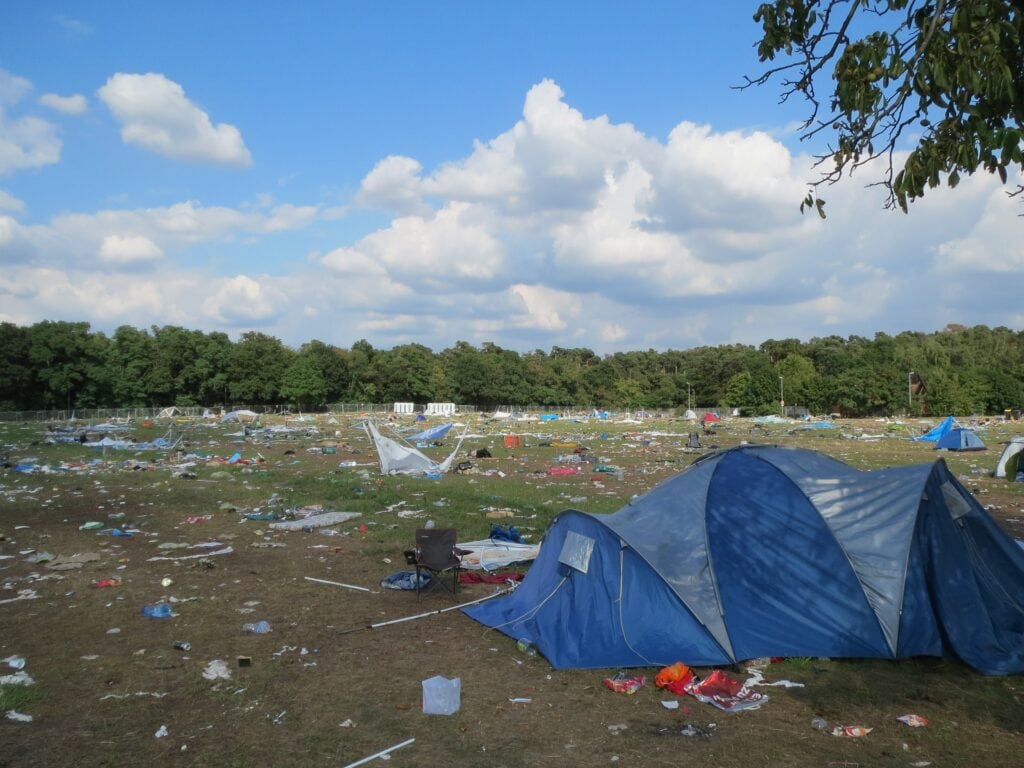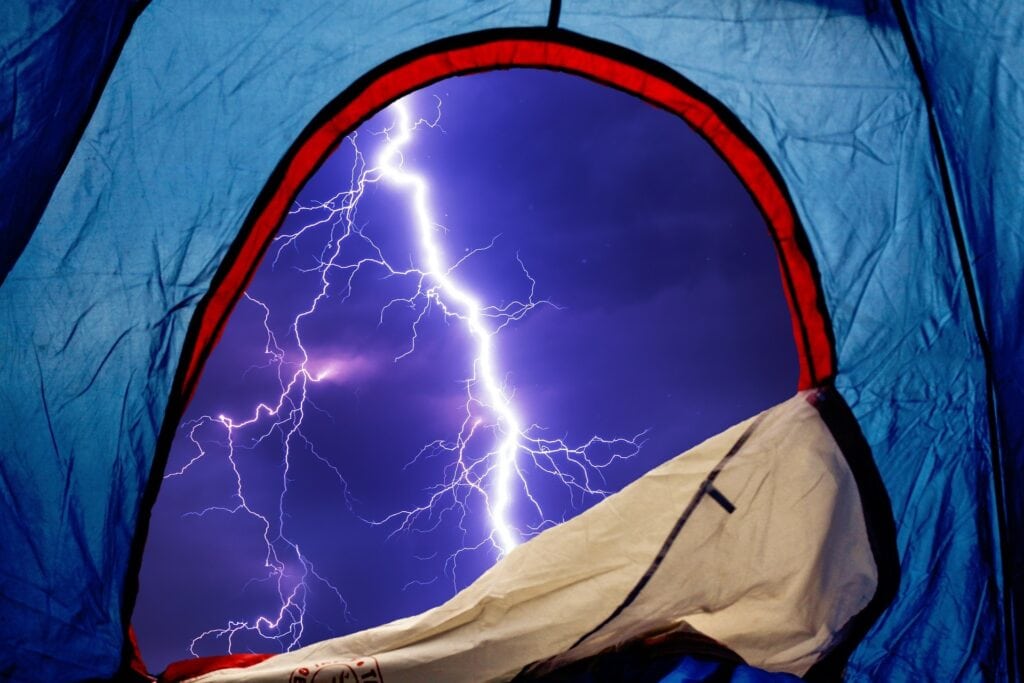We're an affiliate. We hope you love the products we recommend! Just so you know, we may collect a share of sales or other compensation from the links on this page. Thank you if you use our links, we really appreciate it!
There’s a lot of debate about rooftop tents. Some people swear by them; others think they’re too dangerous to use in bad weather. So, what’s the truth? Are rooftop tents safe in wind and storm conditions?
A rooftop can withstand strong winds or a storm. This is because the car or trailer acts as an anchor, keeping the tent in place. The trailer is big enough, and the wind will not be able to move it. However, you should ensure that the car or trailer is securely fastened to the ground before setting up the tent.
In this blog post, I will discuss how safe your rooftop tent is during bad weather and provide tips on staying safe while camping.
How Safe is a Rooftop Tents in Wind
The wind is the most vulnerable time for a rooftop tent. The main problem with wind is that it can pick up the tent and carry it away. However, the following factors make rooftop tent safe in the wind:
The Anchor
As I mentioned, the car or trailer anchors the rooftop tent. This keeps the tent in place and prevents it from being blown away by the wind.
The Weight
Rooftop tents are usually made of heavy-duty materials such as canvas or aluminum. This makes them resistant to high winds. The tent’s weight also makes it difficult for the wind to pick it up and carry it away.
The Shape
Rooftop tents are designed to be aerodynamic. This means that they are less likely to be affected by strong winds. The shape of the tent also makes it more stable in high winds.
Material
In addition, the walls of a rooftop tent are made to withstand high winds. They are usually made of thick canvas or nylon and are reinforced with metal poles. This makes them much more robust than traditional tents, made of thin fabric that can easily be blown away in strong winds.
How to Make Rooftop Tents Even Safer in Wind
Even though rooftop tents are safe in the wind, you can do a few things to make them even safer.
Secure the Tent
Make sure that the tent is securely fastened to the car or trailer. You can do this by tying the tent down or using ratchet straps.
Add Weight to the Tent
You can add weight to the tent by filling the sandbags that come with it. You can also use your camping gear. This will help to keep the tent down in strong winds.
Use Guy Lines
Guy lines are ropes or cords that you attach to the tent’s corners and then stake into the ground. These guy lines will help to keep the tent in place in high winds.
Close all the Windows
When you open the windows, the wind will enter the tent and pressure the walls. This can make the tent unstable. So, close all the windows when it’s windy outside.
Are Rooftop Tents Safe in Storms?
Storms can be dangerous, but they are no match for a well-built rooftop tent. The main problem with storms is the heavy rains and strong winds. Thunderstorms can also cause lightning which is very dangerous when you’re in a metal tent on top of a car.
You need to take note of tornadoes, flash floods, and hurricanes if you live in an area prone to these natural disasters.
If a storm is brewing, the best thing to do is to take down your tent and wait it out in your car or trailer. Rooftop tents are not designed to withstand these conditions and can be damaged easily.
Can Lightning Strike Rooftop Tents?
Rooftop tents offer no protection from lightning. They are more dangerous in a thunderstorm because they are made of metal. The electric charges in the human body attract lightning, and the tents are not substantial enough to discharge these charges safely.
If you are in a thunderstorm, the best thing to do is to take down your tent and wait it out in your car or trailer.

Steps to Take if a Thunderstorm Strikes When You’re Camping
Here are some steps that you should take if a thunderstorm strikes while you’re camping:
Take Down the Tent
It would be best to take down the tent as soon as you hear thunder. This will reduce the risk of being struck by lightning. If you cannot take the tent down, ensure all the windows and doors are closed.
Stay in Your Car or Trailer
If you can, stay in your car or trailer during the thunderstorm. This will provide some protection from the storm. If you cannot get to your vehicle or trailer, ensure you are not touching anything metal.
Unplug all Electrical Devices
Unplugging all electrical devices from the car or trailer would be best. This includes phones, laptops, and lights.
Avoid Touching Metal Objects
Metal objects are a no-no in a thunderstorm. You should avoid touching anything made of metal, including the car or trailer.
Stay Clear of Trees
Trees are the tallest objects in the campground, which makes them more likely to be struck by lightning. It would be best if you stayed clear of them during a thunderstorm.
Assess the Damage
Once the storm has passed, you can assess the damage. If the tent is damaged, you should replace it before using it again.
Tips for Staying Safe in a Rooftop Tent During Bad Weather
Even though rooftop tents are safe in bad weather, there are a few things that you can do to stay safe:
Monitor the Weather Conditions
Before setting up your tent, always check the weather forecast. This will help you to know if a storm is brewing. If there is a chance of bad weather, it’s best to wait it out in your car or trailer.
Take Down the Tent in Bad Weather
If you are already in your tent and the lousy weather starts, the best thing to do is to take down the tent. This will prevent the wind from damaging the tent or blowing it away.
Stay Low in the Tent
When you are in the tent, always stay low to the ground. This will help to protect you from the strong winds and flying debris.
Be Prepared for Emergencies
Always be prepared for emergencies by bringing a first-aid kit, flashlights, and extra batteries. You should also plan where you will go if the tent is damaged or blown away.
Pack the Right Gear
If you know that bad weather is coming, pack the right gear. This includes rain gear and warm clothing; sometimes, you can add a tarp to your tent for extra protection.
Know Your Limits
Don’t push yourself too hard when you’re camping in bad weather. If the conditions are too dangerous, staying in your car or going home is best.
Final Thoughts
Rooftop tents are safe in wind and storms if you take the necessary precautions. Ensure that the tent is securely fastened to the car or trailer and that all the windows are closed. You can also add weight to the tent and use guy lines to help keep it in place. This article has helped you to understand how to keep safe in a rooftop tent during bad weather. Stay safe out there.

We’re passionate about getting the most from your car when it comes to going on adventures and road trips. When you take one of these trips you often need more room in your car than you usually would. This is when we come in, to help you find the best roof tent for your car and needs.

